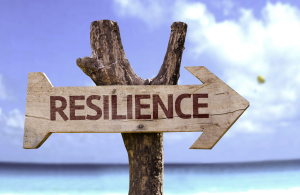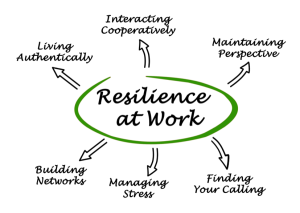-
The greatest glory in living lies not in never falling, but in rising every time we fall – Nelson Mandela
-
She stood in the storm, and when the wind did not blow her away, she adjusted her sails – Elizabeth Edwards
What is resilience?
We all come across difficult points in our lives where we don’t know how we’ll cope, or how we’ll even make it through the day. Some people say that our ability to keep our head down and keep pushing forward is resilience. Others say that it’s our ability to ‘bounce back’, and then there are some who say that it is our ability to stay mentally well during those difficult times. I say that it’s combination of all three. Our ability to adjust and adapt in the face of our difficulties will allow us to keep moving forward (it won’t be easy, but at least we won’t stop), and bounce back – we may not be the same people we were before the challenges, but that’s not necessarily a bad thing – it just means that we’ve grown.
 Resilience is not something that people either have or don’t, it can be taught over time. There may be times when we are more resilient than other times – it depends on our belief in ourselves at the time, and how much stress and trauma we’ve gone through. If we experience multiple traumas or stressors at a similar time, our resilience can be ‘worn out.’ Similarly if we face trauma and survive it, our belief in facing adversity is strengthened, we feel ‘more’ resilient and ready to tackle future challenges.
Resilience is not something that people either have or don’t, it can be taught over time. There may be times when we are more resilient than other times – it depends on our belief in ourselves at the time, and how much stress and trauma we’ve gone through. If we experience multiple traumas or stressors at a similar time, our resilience can be ‘worn out.’ Similarly if we face trauma and survive it, our belief in facing adversity is strengthened, we feel ‘more’ resilient and ready to tackle future challenges.
Even though resilience can be taught and developed over time, there are some factors that can severely affect a person’s ability to learn resilience, especially if we’ve experienced stressors from a young age, when our belief systems, defence mechanisms and behaviours are just being developed. Some factors that can hinder resilience can be:
- Parents with substance abuse problems
- Parents with mental health problems (by this I mean psychological disorders, not depression or anxiety disorders)
- Exposure to domestic violence as a child.
- Experiencing a violent or traumatic encounter, for example an attack or an accident.
- Parents putting the children through a difficult separation or divorce
These factors are not set in stone (each child is different, and will react differently to their childhood experiences); there have been cases of children that have been brought up with the above factors and have come through challenging times stronger.
The question, ‘If you are lucky enough not have ever experienced any adversity, then how do you know you’re resilient?’ is often asked by psychologists. However, realistically, we all experience adversity, trauma or tragedy on some level, whether we succumb to it or overcome it depends on how well we can adapt to and manage the circumstances – but manage we do, in our own way. Which demonstrates that within every individual is an inherent ability to be resilient.
Resilience in the workplace
 Our resilience can be tested within the work environment – especially if our work is extremely stressful. Constant deadlines, workload, pressure of performance can wear down a person’s will to keep going. Our resilience prevents us from giving into the stress and anxiety; it keeps us from stopping and giving up. Resilience is not a trait that people either have or do not have. It involves behaviours, thoughts and actions that can be learned and developed by anyone. There are ways that employers can help build resilience within their workforce, enabling their staff to manage their mental health in a responsible way. If half of your workforce feels overwhelmed, then morale and productivity will also suffer. Below are 10 ways that you can help your employees build their resilience, ensuring a happier, healthier workforce.
Our resilience can be tested within the work environment – especially if our work is extremely stressful. Constant deadlines, workload, pressure of performance can wear down a person’s will to keep going. Our resilience prevents us from giving into the stress and anxiety; it keeps us from stopping and giving up. Resilience is not a trait that people either have or do not have. It involves behaviours, thoughts and actions that can be learned and developed by anyone. There are ways that employers can help build resilience within their workforce, enabling their staff to manage their mental health in a responsible way. If half of your workforce feels overwhelmed, then morale and productivity will also suffer. Below are 10 ways that you can help your employees build their resilience, ensuring a happier, healthier workforce.
Make connections. Good relationships with close family members, friends and colleagues are important. Accepting help and support from those around you strengthens resilience. Employers can help promote an environment that supports and encourages staff to talk about their worries both in their professional and personal life. Recognising the fact that keeping personal life separate from professional life, can be nearly impossible for some people, and giving them space and the resources to talk about it can go a long way towards creating a caring environment.
Avoid seeing crises as insurmountable problems. If you have members of staff that see the worse in every scenario then they may need some training in reframing events. We can’t change the fact that highly stressful events happen, but we can change how we interpret and respond to these events. Try to encourage staff members to look beyond the present to how future circumstances may be a little better.
Accept that change is a part of working life. Certain goals may no longer be attainable as a result of changes in organisational structure or projects. Accepting circumstances that cannot be changed can help your staff focus on things they can control.
Move toward your goals. Develop some realistic goals. Giving your staff high challenging targets, can dishearten then rather than motivate them. Acknowledge and praise their accomplishments and performance. Break down the ‘larger’ target into smaller daily goals, it enables your staff to move towards their goals. Encourage questions like, “What’s one thing I know I can accomplish today that helps me move in the direction I want to go?”
Take decisive actions. Act on adverse situations as much as you can. Take decisive actions, and encourage your staff to do the same – rather than detaching completely from problems and stresses.
Encourage opportunities for self-discovery. People often learn something about themselves and may find that they have grown in some respect as a result of their struggles. Many people who have experienced tragedies and hardship have reported better relationships, greater sense of strength even while feeling vulnerable, increased sense of self-worth, a more developed spirituality and heightened appreciation for life.
Encourage staff to view themselves in positive way. Enabling staff members to develop confidence in their ability to solve problems and trust their instincts helps build resilience. Maybe set up team building exercises where they could work through some challenges together.
Keep things in perspective. Even when facing very stressful situations, try to consider the circumstances in a broader context and keep a long-term perspective in mind. Avoid blowing the event out of proportion.
Maintain a hopeful outlook. An optimistic outlook enables your staff to expect that good things will happen in their jobs. Try visualisation exercises with them to encourage a hopeful outlook, rather than worrying about what they fear.
Encourage them to take care of themselves outside work. Paying attention to our needs and feelings, engaging in activities that we enjoy and find relaxing can promote wellbeing Exercising regularly can help to keep our mind and body primed to deal with situations that require resilience.
Talking about additional ways of strengthening resilience may be helpful. For example, some people write about their deepest thoughts and feelings related to trauma or other stressful events in their life. Meditation and spiritual practices help some people build connections and restore hope. The key is to identify ways that are likely to work well for your organisation and staff.
We have a range of services within our Corporate Service that we can deliver at your workplace, or we can tailor a course to your needs.
- Mediation
- Group Workshops – including Resilience Building, Stress Management, Mindfulness, Tackling Anxiety, and many more.
- Coaching
- Return to work support
- Management support
We are also offering one week free trial on our Video Counselling and our Email Counselling service, if you feel that you or your employees will benefit from trying our Online Counselling service, please contact us.

